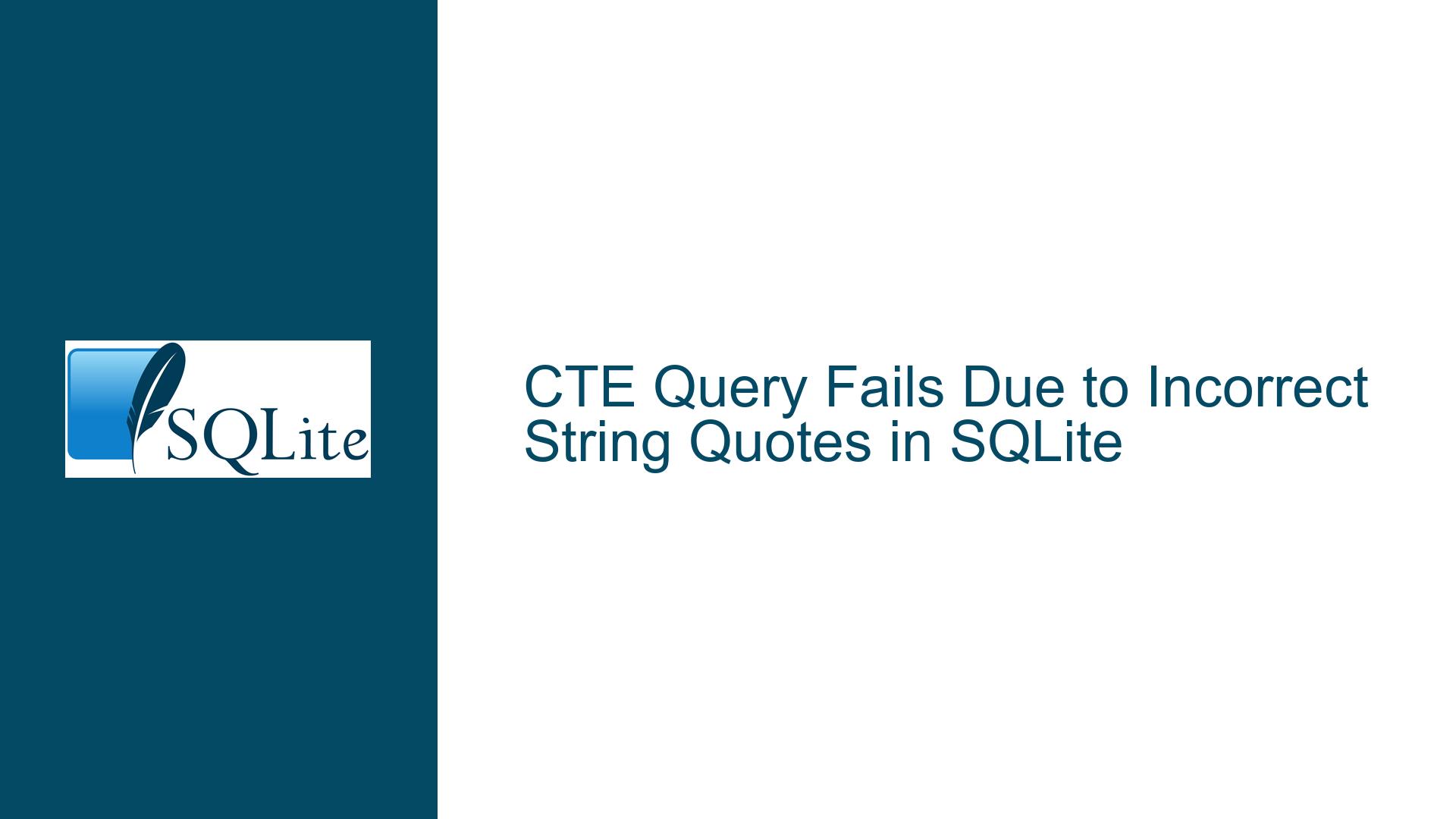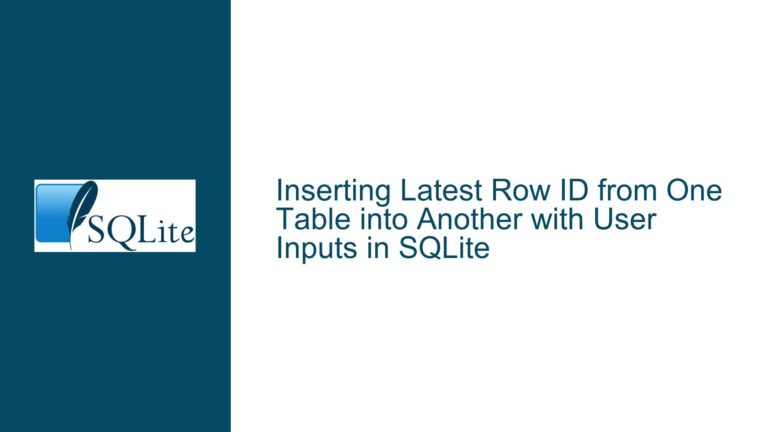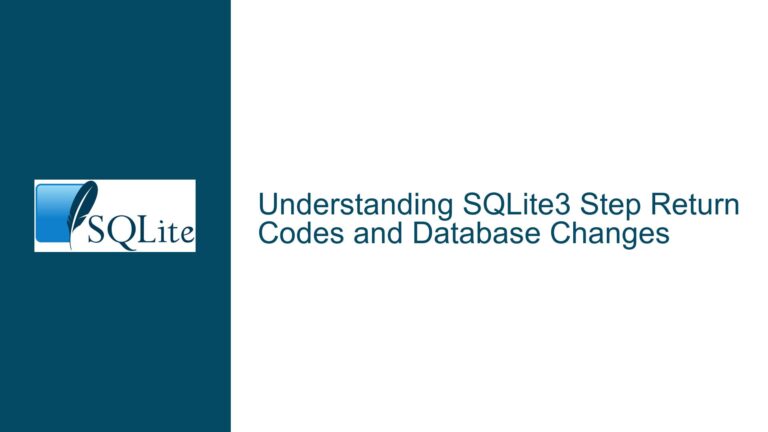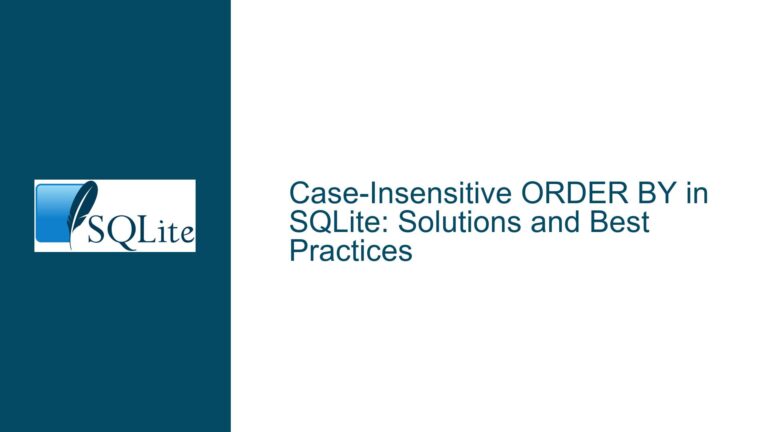CTE Query Fails Due to Incorrect String Quotes in SQLite
Issue Overview: Syntax Error When Referencing CTEs with Double-Quoted Strings
The reported issue involves a SQLite query that utilizes Common Table Expressions (CTEs) failing with the error message: Error while executing SQL query on database 'DatabaseName': near ")": syntax error. The user provided a script that includes a CREATE TABLE statement, an INSERT statement with multiple value tuples, two CTE definitions (IDfromA and NameFromA), and a final SELECT statement that cross-joins the CTEs. While the user initially suspected a problem with CTE handling in SQLite 3.40, the root cause was traced to improper use of double quotes (") for string literals in the INSERT statement.
This error arises because SQLite enforces strict rules about string literals and identifier quoting. Double quotes are reserved for identifiers (e.g., table names, column names), while single quotes (') must be used for string literals. The error message referencing ")" is misleading; the parser detects a syntax inconsistency when it encounters an identifier-quoting character (double quotes) where a string literal is expected. The CTEs themselves are syntactically valid, but the invalid string literals in the INSERT statement create a chain reaction of parsing issues that manifest at the end of the CTE definitions.
The confusion is compounded by differences in SQLite configurations across tools. Some SQLite interfaces (e.g., SQLiteStudio) may disable legacy features that allow double-quoted strings by default, while others (e.g., the command-line shell) permit them depending on compile-time settings. This discrepancy explains why the query failed in one environment but succeeded in another.
Possible Causes: String Literal Misuse and Configuration-Dependent Parsing
Incorrect String Literal Quoting with Double Quotes
TheINSERTstatement uses double quotes ("A","B", etc.) to define string values for theRecordNamecolumn. This violates the SQL standard, which reserves double quotes for identifiers (delimited identifiers). SQLite allows double-quoted strings only when compiled with theSQLITE_DQSoption enabled. If the SQLite instance or front-end tool disables this option (as recommended for standards compliance), double-quoted strings are interpreted as identifiers, leading to syntax errors.SQLite Configuration Variability (
SQLITE_DQSFlag)
SQLite’s handling of double-quoted strings is controlled by theSQLITE_DQScompile-time flag. When set to3(legacy mode), double-quoted strings are permitted. When set to0(strict mode), they are prohibited. Front-end tools like SQLiteStudio may use a strict configuration by default, whereas the command-line shell might use a permissive one. A mismatch between the environments in which the query is executed can lead to inconsistent behavior.Parser Error Propagation Masking the True Issue
The syntax error (near ")": syntax error) does not directly point to the invalid string literals because the parser’s recovery mechanism misattributes the error location. The invalidINSERTstatement creates a malformed AST (Abstract Syntax Tree), causing subsequent tokens (e.g., the closing parenthesis of the CTE definition) to be flagged erroneously. This makes debugging non-intuitive, as the error message does not reference the actual problem location.Tool-Specific SQLite Build Settings
The user encountered the error in SQLiteStudio but not the command-line shell. This suggests that SQLiteStudio uses a SQLite build withSQLITE_DQS=0(disabling double-quoted strings), while the command-line shell usesSQLITE_DQS=3(allowing them). Front-end tools often enforce stricter SQL standards, whereas the command-line shell prioritizes backward compatibility.
Troubleshooting Steps, Solutions & Fixes: Correcting Quoting and Configuring Environments
Step 1: Replace Double Quotes with Single Quotes in String Literals
Immediate Fix:
Modify the INSERT statement to use single quotes for string literals:
insert into A values (65,'A'), (66,'B'), (67,'C'), (68,'D'),(69,'E'), (70,'F'),(71,'G'), (72,'H'),(73,'I'), (74,'J');
This ensures compliance with SQL standards and resolves the parsing conflict. Double quotes should only enclose identifiers with special characters (e.g., "table-name"), which is unnecessary in this case.
Verification:
Execute the corrected script in the same environment where the error occurred. If the error persists, proceed to Step 2.
Step 2: Check SQLite Configuration for Double-Quoted String Handling
Determine SQLITE_DQS Setting:
Run the following pragmas in your SQLite environment to check if double-quoted strings are allowed:
PRAGMA dqs_ddl; -- Returns 1 if allowed in DDL, 0 if disallowed
PRAGMA dqs_dml; -- Returns 1 if allowed in DML, 0 if disallowed
If both return 0, double-quoted strings are prohibited.
Adjust Configuration (If Possible):
If you control the SQLite build, recompile it with the desired SQLITE_DQS setting. For example, to disable double-quoted strings:
-DSQLITE_DQS=0 # Disables double-quoted strings in both DDL and DML
If using a front-end tool, check its documentation for SQLite configuration options. Some tools allow custom compile flags via plugins or settings.
Step 3: Standardize SQL Dialect Across Environments
Enforce Single Quotes in All Queries:
Adopt a style guide that mandates single quotes for string literals, even in environments where double quotes are permitted. This prevents future errors when migrating queries between systems.
Use Linters or Preprocessors:
Integrate SQL linters (e.g., sqlfluff, sqlcheck) into your workflow to flag non-standard quoting. For example, sqlfluff can be configured with rules enforcing single-quoted strings:
[sqlfluff]
dialect = sqlite
[rules]
quoted_literals.force_enable = True
quoted_literals.preferred_quote_style = single
Step 4: Diagnose Tool-Specific Parsing Differences
Reproduce the Error in Multiple Environments:
Execute the original (erroneous) script in:
- SQLite command-line shell
- SQLiteStudio
- Other tools (e.g., DB Browser for SQLite, Python’s
sqlite3module)
Compare Results:
If the error occurs only in specific tools, confirm their SQLite versions and compile options. For SQLiteStudio:
- Navigate to
Help > Aboutto view the SQLite version. - Check if it uses a custom SQLite build (common in packaged applications).
Mitigation:
- Avoid relying on non-standard SQL features (e.g., double-quoted strings) if cross-tool compatibility is required.
- Report the issue to the tool’s maintainers if its SQLite build unnecessarily deviates from standard behavior.
Step 5: Address Misleading Syntax Error Messages
Enable Verbose Parsing Logs:
If available, enable SQLite’s parser debugging to trace the exact token sequence causing the error. This requires a custom build with YYTRACE enabled:
-DYYTRACE=1
Recompile SQLite and run the query to see detailed parser state transitions.
Interpretation Example:
A trace might reveal that the parser treats "A" as an identifier, expecting a comma or closing parenthesis afterward. When it encounters "A" as a string, the parser’s state machine enters an invalid state, leading to a misreported error at the next token (e.g., )).
Step 6: Update SQLite and Tools to Latest Versions
Check for Known Issues:
Verify if the SQLite version in use (3.40+) has regressions related to CTE parsing or string handling. Consult the SQLite changelog for fixes in subsequent releases.
Upgrade SQLiteStudio:
Ensure the front-end tool is updated to the latest version, which might include a more permissive SQLite build or improved error messaging.
Step 7: Refactor Queries for Robustness
Explicit CTE Column Aliasing:
While not necessary here, explicitly aliasing CTE columns can prevent ambiguities:
with IDfromA (RecordID) as (select distinct RecordID from A),
NameFromA (RecordName) as (select distinct RecordName from A)
select RecordID, RecordName from IDfromA, NameFromA;
Avoid Cross-Joins Unless Intended:
The final query produces a Cartesian product of all RecordID and RecordName values. If this is unintended, add a join condition or use CROSS JOIN for clarity:
select RecordID, RecordName from IDfromA CROSS JOIN NameFromA;
Final Recommendation: Adopt Strict SQL Standards
To prevent similar issues:
- Always use single quotes for string literals.
- Compile SQLite with
-DSQLITE_DQS=0to enforce standard quoting. - Validate queries across multiple tools before deployment.
By addressing the root cause (incorrect string quoting) and understanding configuration dependencies, users can avoid syntax errors and ensure consistent query execution across environments.






